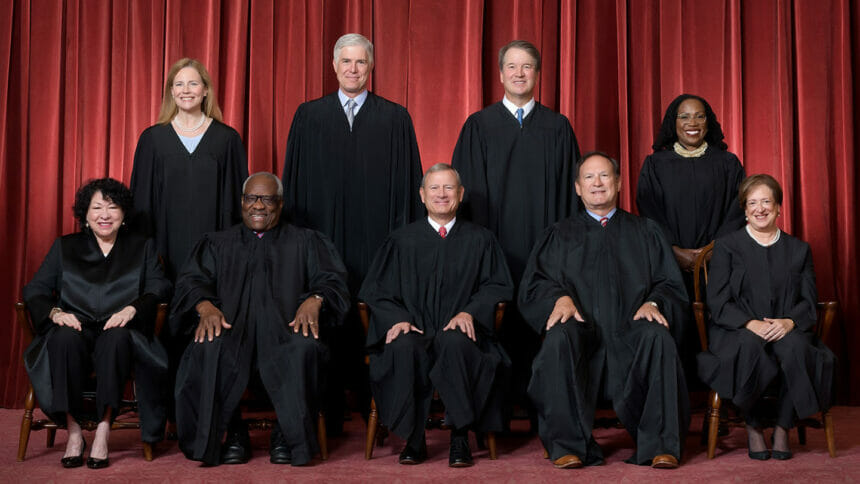
Supreme Court justices on Wednesday signaled their willingness to give courts more discretion in interpreting “ambiguous” federal statutes rather than leaving that work to the agencies tasked with implementation.
Abandonment of the so-called Chevron doctrine could have implications for nearly every US sector and industry, including long-term care. Existing practice requires courts to give federal regulators deference when a statute is unclear or could be interpreted two ways, but experts said a change could embolden more lawsuits challenging key rules affecting nursing homes.
A decision overruling Chevron would likely require Congress to craft more detailed legislation that delegates powers more specifically. It also could “have a significant impact” in keeping administrative agencies from overreaching when such delegation doesn’t exist, said Mark Reagan, managing shareholder of Hooper, Lundy & Bookman.
“This will have impact across the entire regulated economy, including Medicare, Medicaid and other healthcare legislation,” he told McKnight’s Long-Term Care News. “If overruled, I would expect there to be serious consideration in some quarters to reverse prior decisions made in reliance on Chevron in the healthcare industry, particularly those involving complex Medicare reimbursement methodologies.”
In the long-term care sector, Reagan said the Centers for Medicare & Medicaid Services might have to change how it approaches its Requirements of Participation and reimbursement rules.
That might not constrain CMS, Reagan said, but instead lead to more opportunities for successful litigation if the agency’s presumed authority “is far from clear.”
Two fishy cases
Many conservatives have cheered the possibility of a reversal, which is being pursued by a group of herring fisheries that argue their livelihood is threatened by a Commerce Department rule requiring them to pay for overfishing monitors onboard their boats.
Those fishermen took two separate cases to the court for nearly four hours of hearings Wednesday. The full court will weigh Relentless v. Department of Commerce, but Justice Ketanji Brown Jackson had to recuse herself from Loper Bright Enterprises v. Raimondo, in which she heard lower court arguments.
The court’s conservative majority peppered US Solicitor General Elizabeth Prelogar with questions about Chevron’s ability to create regulatory unreliability, or the idea that existing rules can be routinely “flipped” by agencies without any warning to the businesses they regulate.
“The reality of how this works is Chevron itself ushers in shocks to the system every four or eight years when a new administration comes in, whether it’s communications law, securities law or competition law or environmental law. It goes from pillar to post,” said Justice
Brett Kavanaugh. “It’s just massive change. That is at war with reliance. That is not stability.”
Lawyers for the fisheries argued that courts could review contested agency actions for their persuasiveness, rather than reflexively deferring to the agency’s interpretation. That approach appeared to be favored by the court’s conservatives, too, Reagan noted.
Liberal leanings
The court’s decision will likely be split, as several more liberal justices appeared inclined to let the 40-year-old doctrine stand.
Justice Elena Kagan used real-life cases ranging from classifying a product for the Food & Drug Administration and possible legislation on AI to illustrate why courts might not be the best final arbiters.
“There are just some times when you look at a statute, and the most honest reading is that there is a gap there because of the limits of language, because of the limits of our ability to predict the future. And so who fills that gap?” she asked. “It’s best to defer to people [agency staff] who do know, who have long experience on the ground, who have seen a thousand of these kinds of situations. Judges should know what they don’t know.”
Kagan argued that the intent of Congress is to have the agencies it empowered make those decisions, not a series of federal courts that could conflict with each other based on their geography and political leanings.
Others, including conservative justice Samuel Alito, also questioned whether a revised approach might lead to more judicial activism. He referred to Chevron’s initial popularity when it was adopted by the Court in 1984 as a conservative tool to stymie a liberal DC Circuit Court.
That policy-making concern resonated with Brendan Williams, an attorney and president and CEO of the New Hampshire Health Care Association.
“Those providers looking to the courts for salvation under a new approach should consider Health and Hospital Corp. of Marion County, Indiana v. Talevski, last year’s 7-2 Supreme Court decision that, in my opinion, fabricated out of whole cloth a right to sue publicly-owned nursing homes,” he said. “When courts, even conservative courts, are allowed to make policy, the consequences could be chaotic and unpredictable.”
Williams added that he was nervous that the conservative majority appears ready to institute an older precedent that was effective in the New Deal’s regulatory-building heyday.
“These days, with an utterly inert Congress, the complex task of governance could unravel if those with lifetime appointments, unaccountable in any way to the public, can second-guess agency scientific analyses,” he added. “Though it perhaps seems improbable, the day may come when an agency interprets an ambiguous statute in a ‘reasonable’ way beneficial to nursing homes, and those hostile to the sector challenge that rule before a judge who is also hostile to the sector. … That judge no longer must offer any deference to that agency. So it cuts both ways.”
Decisions in the two cases are expected before the court adjourns in June.




